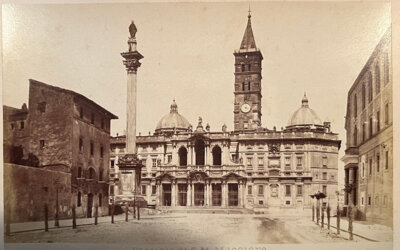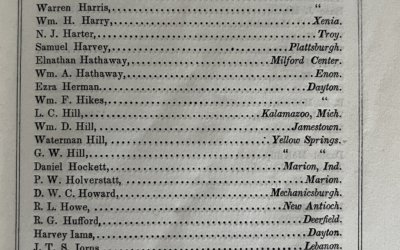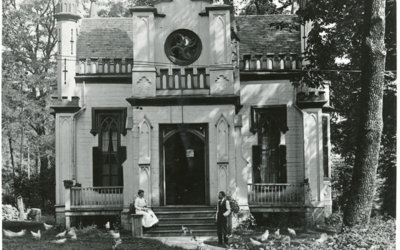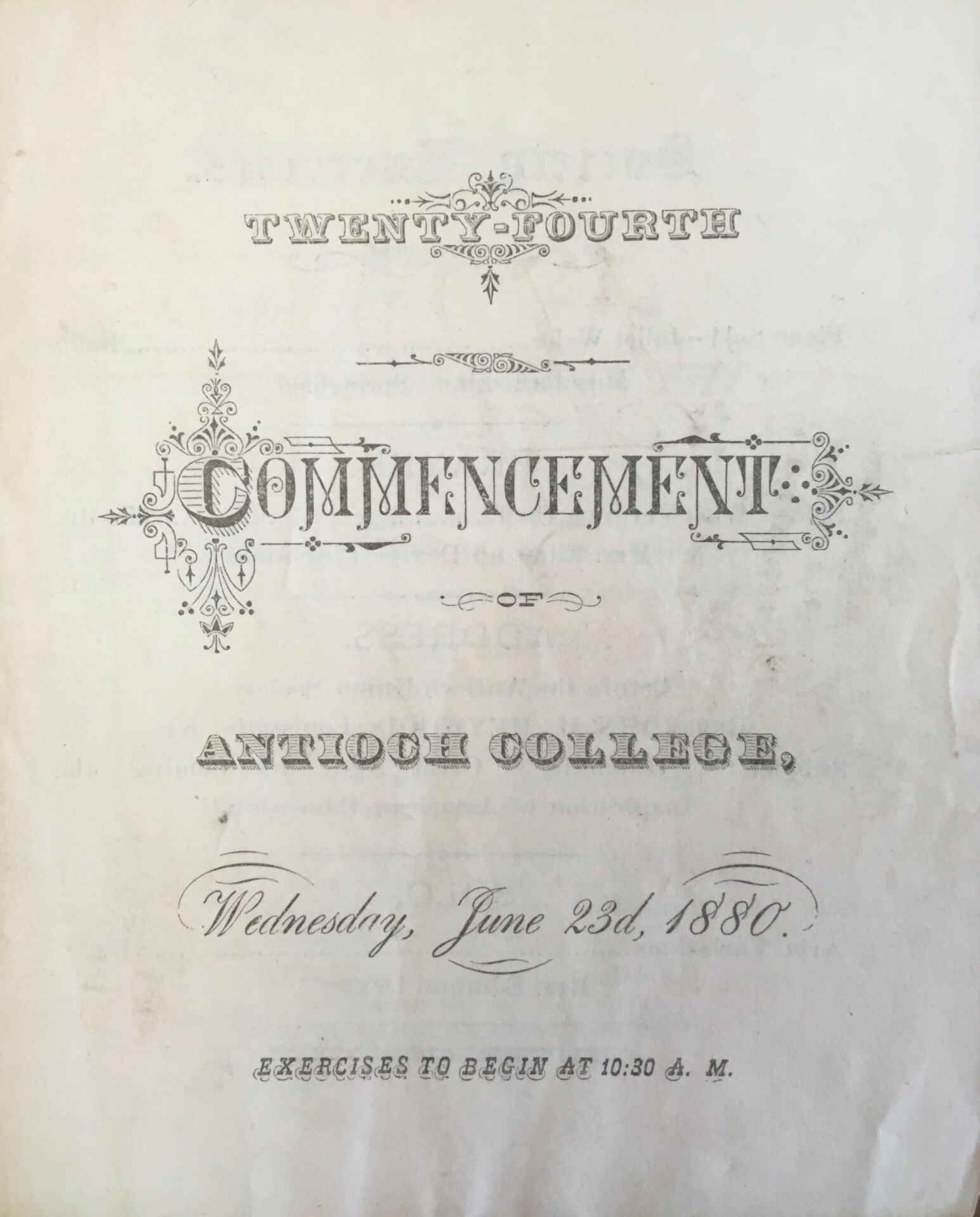 From the Department of Variation-on-a-Theme, suppose they gave a Commencement and no one commenced. Antioch College did just that in 1880, having no graduates that year, though it may not have been for lack of Seniors. According to the following article reprinted from the July 1880 issue of The Antiochian, only students that pursued the Bachelor of Arts degree could be regarded as actual College graduates. Antiochians who primarily studied the Sciences—Geology, Botany, Astronomy, Zoology, and Physics all had a place in the 19th century curriculum—could complete their coursework and apparently not be considered graduates. The course catalogs of the period have little to say on this, though the 1877-78 issue does delineate between Antioch “undergraduates” (12) and “students pursuing college studies” (11).
From the Department of Variation-on-a-Theme, suppose they gave a Commencement and no one commenced. Antioch College did just that in 1880, having no graduates that year, though it may not have been for lack of Seniors. According to the following article reprinted from the July 1880 issue of The Antiochian, only students that pursued the Bachelor of Arts degree could be regarded as actual College graduates. Antiochians who primarily studied the Sciences—Geology, Botany, Astronomy, Zoology, and Physics all had a place in the 19th century curriculum—could complete their coursework and apparently not be considered graduates. The course catalogs of the period have little to say on this, though the 1877-78 issue does delineate between Antioch “undergraduates” (12) and “students pursuing college studies” (11).
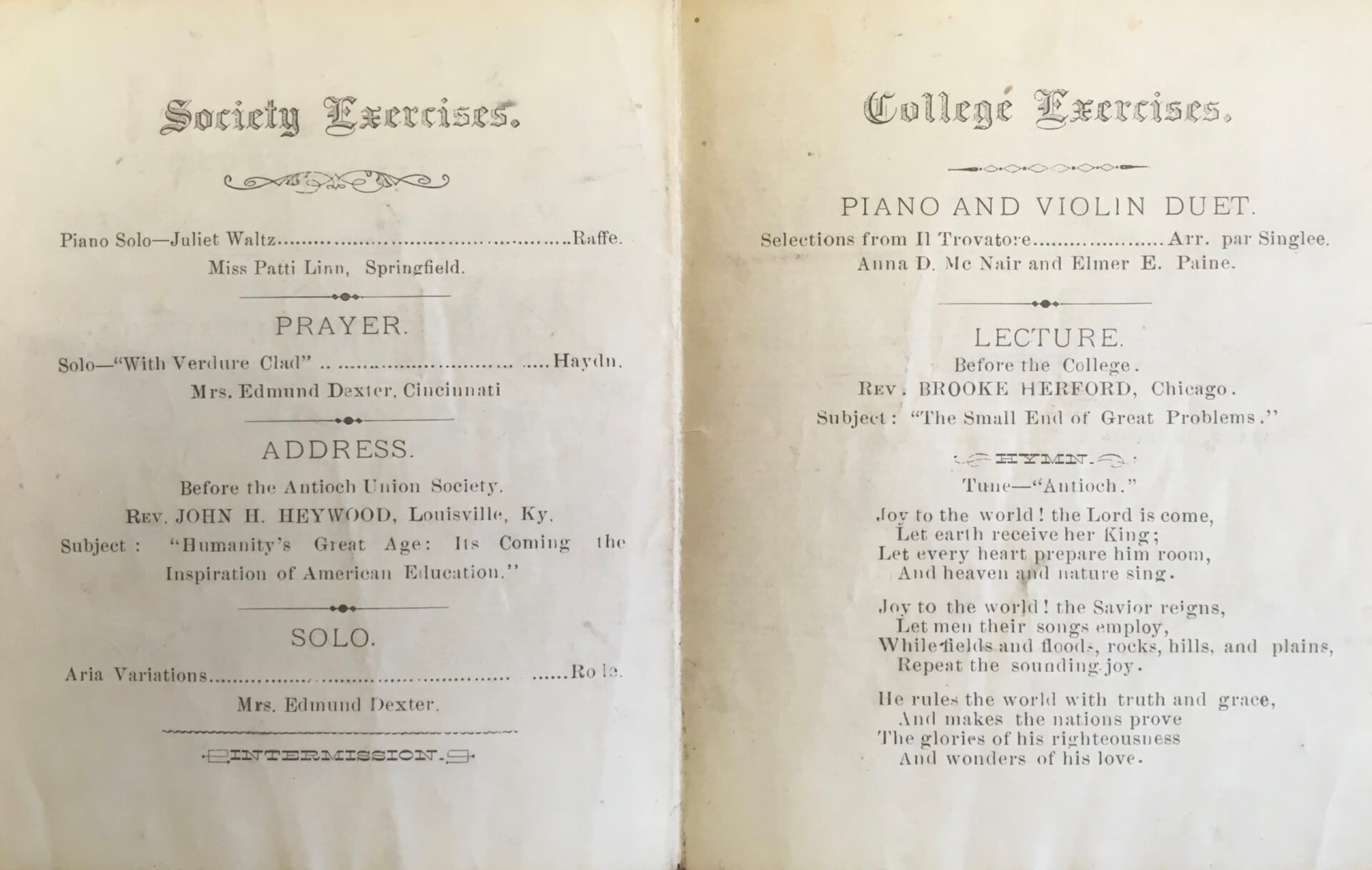 Practically every notable identified below is a member of the Board of Trustees, who traditionally held their annual meeting at Commencement time. Perhaps the exercises were put on for their benefit, for the article identifies much speech-making on the part of Board members. Reverend John H. Heywood, who gave the Commencement Address, “The Small End of Great Problems,” had been a Trustee of the College since 1871. Brooke Herford had joined the Board just three days before delivering his discourse on “The Great Ages.” Dr. Amos Duncan, a former Army surgeon and future Professor of Physiology, who in 1880 directed care of buildings and grounds, had also served on the Board since 1871 and was responsible for the “viands” served that evening. Even Samuel Derby, College President since 1877, was a Trustee.
Practically every notable identified below is a member of the Board of Trustees, who traditionally held their annual meeting at Commencement time. Perhaps the exercises were put on for their benefit, for the article identifies much speech-making on the part of Board members. Reverend John H. Heywood, who gave the Commencement Address, “The Small End of Great Problems,” had been a Trustee of the College since 1871. Brooke Herford had joined the Board just three days before delivering his discourse on “The Great Ages.” Dr. Amos Duncan, a former Army surgeon and future Professor of Physiology, who in 1880 directed care of buildings and grounds, had also served on the Board since 1871 and was responsible for the “viands” served that evening. Even Samuel Derby, College President since 1877, was a Trustee.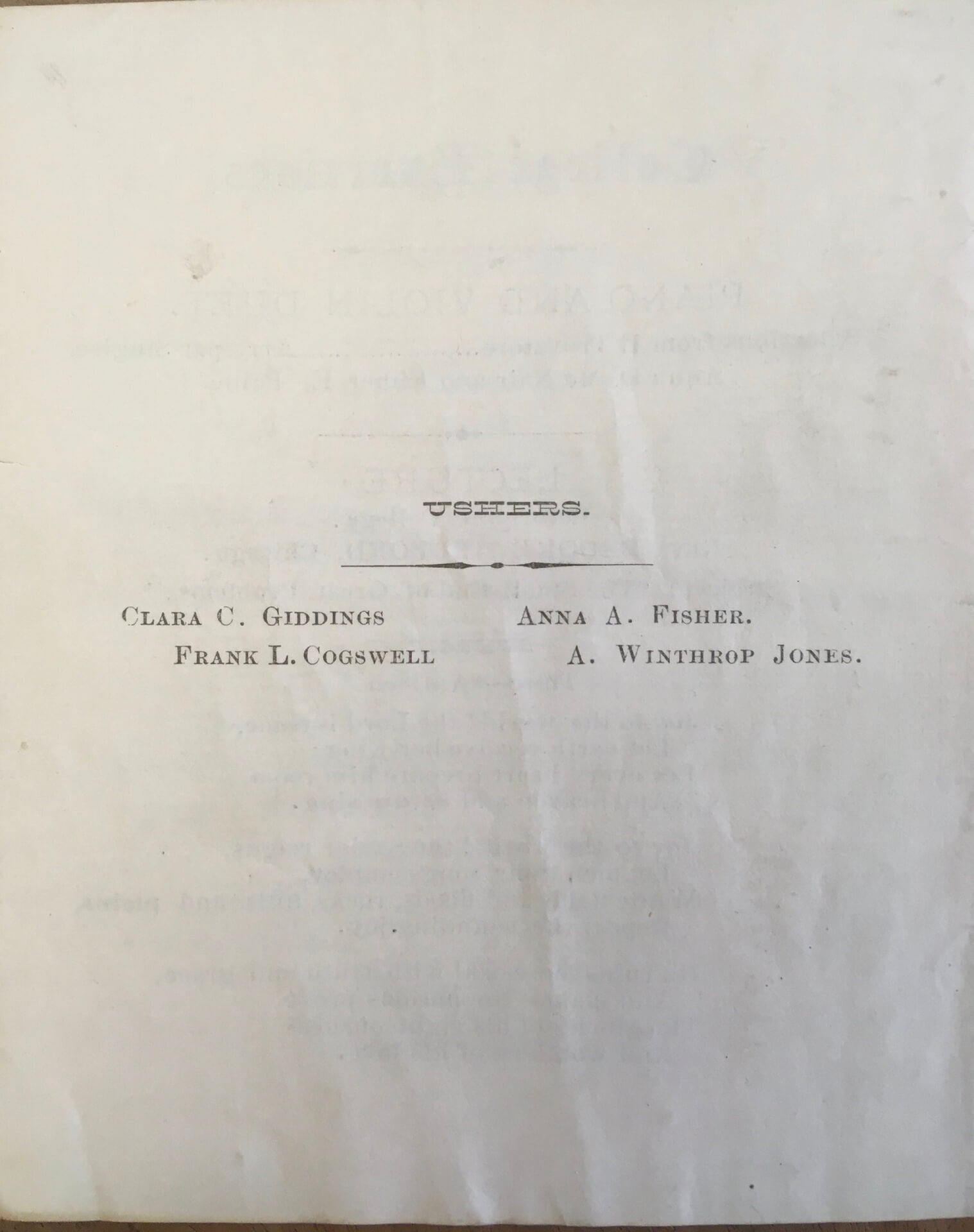
The action reported by Trustee General J. Warren Keifer, an Antiochian of the 1850s whose career in US Congress was made possible by his service in the US Civil War, had been taken at the meeting held on June 21. They had decided to sell all property the College owned outside the state of Ohio to (so the minutes say) restore the endowment “to the original amount,” which was $100,000. Antioch College was in historically difficult financial straits at that time (even for Antioch College), and the day before the Board had engaged in informal discussion about closing down entirely, an eventuality that came to fruition following the 1880-81 school year.
from The Antiochian, July 1880
COMMENCEMENT WEEK.
Commencement week this year was like “the play of Hamlet with Hamlet left out.” It was a commencement with no graduates to commence. Nevertheless we had a very interesting play, even without the Hamlet. In lieu of the graduating essays, on Commencement day, we had a lecture from Rev. Brooke Herford of Chicago, on “The Small End of Great Problems.” This was so happy and good, that the omission of the parts of the graduating class was forgotten, and again all went home congratulating themselves and one another on the good time they had had.
Yellow Springs enjoyed the privilege of a visit from one of the Trustees, Rev. J. H. Heywood, formerly of Louisville, Ky., for ten days prior to Commencement day. Mr. Heywood is one of the most intelligent and wise of our very able Board of Trustees and one of those who has the interests of Antioch most sincerely at heart. His visit here gave him an opportunity to mingle with the citizens of the place, the students, and the Faculty, and to see for himself, and learn from all parties what was the work of the school. He preached a sermon of rare ability and excellence, at the Christian Church, on Sunday, June 13, and again at the College, on the Sunday preceding Commencement, June 20. The sermon at the College was on “The Grandeur, Power, and Necessity of Faith in Christ,” from the text, “That ye might believe that Jesus is the Christ, the Son of God, and that believing ye might have life through his name”—John 21:31. It was an able and eloquent defense of Christianity, presenting the Christ of the New Testament, his life, and the life of faith in him, as the necessary element in forming all true individual life, and in doing any true work for the world. This faith was commended with a convincing sincerity and an earnestness of persuasion which could not fail to move every one who heard it, the young and the old. We have not space for an abstract of it, and if we had, it would fail to do justice to the sermon and the force with which it was presented. The opportunity given by this visit of Mr. Heywood to see more of the inside life of the College than our Trustees have been accustomed to have, was valuable as a basis of their action at their annual meeting.
The Term’s work was completed, and reports given out on Saturday before. The Alumni decided to have no public meeting on Tuesday evening, and the Literary Society took it for their anniversary. This left Monday and Tuesday forenoon free to get ready for the meeting to follow.
COMMENCEMENT DAY.
Wednesday, June 23.—As said before, this was a commencement day without anybody to commence. Antioch never considers any as graduates except those who take the degree of Bachelor of Arts. Other colleges have Scientific courses, Philosophical courses, Literary courses, and others, on the completion of which a diploma is given, the graduates in them appearing in public parts. Even graduates from Normal courses are sometimes assigned parts for Commencement day, and the students swell the number of annual graduates. Every year students leave Antioch who have here pursued the higher college studies for several years, and who in many other colleges would graduate from some one of the courses. At Antioch they are not counted as graduates. Thus the number of annual graduates is always comparatively small. This year there were none. Still it was Commencement day.
The day was charming. The names of the orators drew together an appreciative audience, but not so large as on some former occasions. As had been done for two years before by necessity, so now by design, the Lecture before the Literary Society was appointed for Commencement day. The lecturer was Rev. J. H. Heywood. In place of the graduating essays the Faculty secured a lecture from Rev. Brooke Herford, of Chicago. These were the leading exercises of the day. No band of music was employed, but music of rare excellence was gratuitously tendered.
The exercises commenced at 10:30. First were those of the Society. They were introduced with a Piano Solo, by Miss Patti Linn, of Springfield, who showed herself a performer of superior taste and skill. Prayer was offered by Rev. Adams Ayer, of Boston. Then followed a Solo, Haydn’s “With Verdure Clad,” by the celebrated soloist, Mrs. Edmund Dexter, of Cincinnati. Mr. Heywood then gave his address before the society: Its subject was “Humanity’s Great Age; its Coming the Inspiration of American Education.”
The lecturer first spoke of two of the “Great Ages,” the “Periclean Age,” when the Grecian genius bloomed out in all its richness, making the country glorious beyond all that the world has known in the development of art, the unfolding of grace and beauty; and of England’s “Elizabethan Age,” when so many master minds gathered around the throne of the great Queen—Shakespeare, Bacon, Spenser, Ben. Johnson, Sir Philip Sydney, the soul of honor and chivalry, whom Coleridge, with rare felicity of language, characterizes as “the star of serenest brilliance in the glorious constellation of Elizabeth’s court, who held high converse with Spenser on the ideal of supersensual beauty.” From these “Great Ages” the speaker passed on to a consideration of the world’s truly “Golden Age” which is yet to come; to be made such, not by the inestimable treasures of California or Nevada mines, but by the mental and moral wealth of a civilization infinitely rich in privileges and opportunities of generous culture for all minds and all hearts. Of this “Humanity’s Great Age,” our age, with its idea and purpose of universal education, is the prophet and the pioneer. In development of this thought, the speaker referred to the influence respectively exerted by the large universities and the smaller colleges and academies. Immeasurably important is it to have the great light-houses at Cambridge, New Haven, Charlottesville, Ann Arbor, Baltimore, with brilliant lights burning in their lofty towers, and throwing their radiance far and wide; but surely not less important is it to have the many smaller light-houses, with towers less lofty indeed, and with reflectors less powerful, but whose lamps, fed with purest oil, though lighting singly but small districts, unitedly illume the country. It is this pervasive and continuing illumination, it is this enlightening of the common mind, this developing and expanding of the general intelligence, which is the distinguishing characteristic of our age, and its glory. This it is which, above all things, makes it the forerunner of “Humanity’s Golden Age,” and the assured coming of that age is the mighty inspiration of American Education.
The address was delivered in Mr. Heywood’s happy style, and was greatly enjoyed by the audience.
After the address Mrs. Dexter sung another Solo: Rodeos “Aria Variation.” This was enthusiastically received, applauded and heartily encored. Mrs. Dexter responded by singing a charming Scotch ballad. She was interrupted in this by the scream of the 12 o’clock whistle of the saw-mill, which prolonged its screech, much to the amusement of both Mrs. Dexter and the audience, as if it was determined that she should not resume her song.
At the end of the Society’s exercises an intermission was given, when the exercises of the College succeeded. These were opened by a Piano and Violin Duet, “Selections from II Trovatore,” arranged by Singlee, by Anna D. McNair, of Yellow Springs, and Elmer E. Paine, of Xenia. Then came the lecture of Rev. Brooke Herford, of Chicago, on “The Small End of Great Problems.” No sketch can give an adequate idea of the freshness, the wit and humor, and the eloquence with which the practical sound sense of the lecture was given. It held the audience in the happiest mood to the end. He, too, like Mrs. Dexter, was interrupted by the envious steam whistle screaming for 1 p. m., which screeched on and on, as if noise and not work was the order of the day. Mr. Hereford sat down and waited till it was through. The speaker said:
“I want to give you a practical hint towards simplifying the problems of life: it is to take hold of them by the smaller end. Every man is, as it were, in the center of a universe, every section of which, I though a point where we stand, stretches off into infinity. Right about us everything is plain, but as the distance from us increases things become mysterious. The mistake is in wishing to understand the distant and mysterious, off towards the large part of the section, before making ourselves acquainted with what is plain at the small end close by us; and thus we get dazed with the vastness of the problems and think we never can solve them, when beginning at the smaller end we would find easy work.
The old philosophers made this mistake. They tried to begin at the large end and find out what the universe was made of. The old theologies bothered themselves about the eternal plans and decrees of God, and had little idea of what He is doing here and now. Here lies the greatness of the science of the present day. The science of the ancients contented itself with ‘essences;’ the science of to-day grapples with the facts about us. Newton observes an apple and finds out gravitation. Franklin gets a little lightning between his knuckles and finds out electricity.
In the moral world men are beginning to take hold of problems at the smaller end. This is due to Christianity. The place to grapple with sin is not with the action, but the thought. This was the method of Christ. He brought moral problems down from the clouds to the practical question of what is best for to-day. When one said to him, ‘Lord, are there few men that be saved?’ Jesus would not touch the question, but told him to get saved himself. ‘Strive to enter in at the straight gate’ yourself. So with all moral problems: do the duty that is near the best you can, and the far on will gradually open out to you.
So in application to thought. The problems of God, and eternity and free-will will press upon you, and if you begin at the large end and attempt to solve them at once, you will be lost—the I mind becomes dazed; but I come to the nearer end of it. I go into the field and see a leaf or flower. I take it into my hand, and I can not think it made itself. Take man, what is he? Where is he going? Take it at the larger end and you are puzzled. The question of free-will perplexes you. But when it comes to the question at night whether you shall go to bed or sit up a half hour longer, it is plain that your will is free.
Youth is prone to be impatient, anxious to solve large problems to get into large business, to attain great wealth and high position at once. The true way is to begin at the smaller end. It is enough for youth to be active; the rest will come by and by. Begin at the smaller end and work outward. If you want to become great and to do great work, do the small duties of to-day. Be very tolerant and patient and appreciative of things and persons about you. There is more in man than we can know here, but there is light enough to lead us ever to what is more.”
The lessons of that lecture will never be forgotten and its impressions will never be effaced. In the satisfaction it gave we forgot the absence of a graduating class.
Gen. J. Warren Keifer, for the Trustees, reported the action which they had taken, as given elsewhere, and gave a hopeful view of the situation.
The usual closing hymn, “Antioch,” was sung to the words “Joy to the world!” all the congregation joining, and the audience dispersed to the
COMMENCEMENT DINNER.
This was furnished by Dr. Duncan. Substantial viands were provided at fifty cents a ticket. President Derby presided, and speeches by Rev’s. Heywood, Wendte, Ayer, Coan, Herford, Robert Hosea, G. W. Hufford, and others, enlivened the occasion.
The President’s Reception in the evening was fully attended, affording a pleasant reunion to many who came to meet old friends and to make the acquaintance of new ones, and to congratulate each other on the good time the day had given them.
“Songs From the Stacks” is a regular selection from Antiochiana: the Antioch College archives by College Archivist Scott Sanders.

